Meet New Day: Julie Mallozzi 2019

I am an independent documentary filmmaker and teacher based in Boston, MA. As a person of mixed heritage, I am interested in the ways cultural traditions from around the globe intersect, hybridize, and are turned to new social purposes far from their original context.
My filmCircle Up tells the story of a group of mothers who seek true justice for their murdered sons - justice that involves not revenge and mass incarceration but forgiveness, accountability, and community healing. The film exists as a 69-minute feature and a 14-minute short.
When I first learned that Native American-inspired peacemaking circles were helping prevent violence in multi-cultural urban settings, I was intrigued. I traveled all over the country researching circle work and then found my primary subject, Janet Connors, right near my home.
I was drawn to this Irish-American woman with a huge heart who learned to forgive her son’s murderers to achieve personal and community healing. A lifelong community activist, Janet responded to her own trauma by drawing on what she had learned from native elders about restorative justice. Documenting her journey has been one of the great privileges of my life.
Circle Up was a labor of love that took over five years to complete, and grew beyond Janet to include Clarissa Turner and a wider group of survivors of homicide victims. I am now finding further satisfaction in seeing how the film’s story can help viewers experience what restorative justice looks and feels like. Restorative justice is an approach that brings together stakeholders when harm has occurred to identify what is needed to repair the harm and restore balance in their community.

We were thrilled to show Circle Up to Massachusetts state legislators as they debated criminal justice reform, and then later passed a bill that included a restorative justice provision. The film is shown in prison to help inmates hold themselves accountable for their actions. Faith communities use it to explore the topics of forgiveness and social responsibility. My film subjects and I just presented a training for 20 schools in New York City that are implementing restorative justice as a way to break the school-to-prison pipeline. If Circle Up can save one life, or even prevent a handful of vengeful acts, I feel that these years of work will have been well worth it.